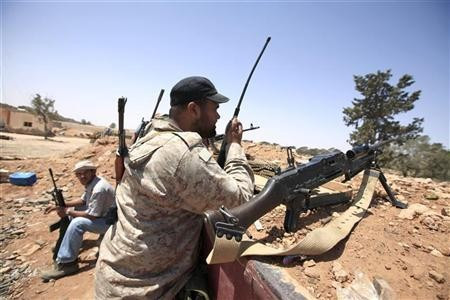Are the Libyan rebels turning against Nato?

In the latest development of the conflict in Libya, it has been reported that rebels pushed deeper into government-held territory south of the capital on Wednesday. Their advance came as good news for the Alliance who suffered a series of political and diplomatic setbacks last week when both the US Defence secretary and the UK Admiral Sir Mark Stanhope attacked its military capabilities and operational skills.
It emerged on Wednesday that the Libyan rebels on the front-line near Misrata have been inching slowly west towards the neighbouring town of Zlitan along the coastal road to the capital. However later on conflict reports emerged as they allegedly had to fall back due to fire from Gaddafi's government forces.
In the Western Mountains, on the other hand, which is one of the stronghold of the rebel fighters, they were said to have built on gains made in the past few days by pushing pro-Gaddafi forces out of two villages, located approximately 150 km south-west of Tripoli
Despite headlines insisting the rebel's fighters are progressing west, the reality is that they are still a long way from Gaddafi's main base of Tripoli. They have now started their uprising against the Libyan government four months ago and despite the involvement and support of Nato, they have not yet managed to gain significant grounds.
All the same can be said about the Alliance however as the bombing campaign on Tripoli that started three months ago, appears to have resulted in the increase of the support for Gaddafi in the capital, rather than his demise.
In view of the little advancement accomplished with the Alliance's support, recently, the rebels have become more critical and expressed frustration that NATO has not been more active at taking out Gaddafi's forces, and is not doing more to coordinate with fighters on the ground.
Last week, government officials in Libya say their forces have shot down two rebel helicopters in the east of the country which has prompted even more questions over the effectiveness of NATO's UN mandated no-fly zone.
Meanwhile, reports also emerged that the key city of Ajdabiya is now the focus of a major onslaught by Gaddafi's forces as doctors revealed that at least eight rebels have been killed.
On Sunday however, attempting to prove that the Alliance's input is not obsolete, NATO announced it has destroyed a significant amount of government ammunition near the capital Tripoli, as well as 25 tanks and other military vehicles around Misrata and Ajdabiya,.
While the rebels are demanding for more help they also now have a growing disillusionment when it comes to NATO's assistance, and are still angry at the fact that since the alliance took over the no-fly zone, 20 anti-Gaddafi fighters have been killed and dozens injured by the raids.
According to RT's Egor Piskunov, who has spoken to some of the rebels in the city of Benghazi Muftakh Abdul Ghani, a rebel fighter explained:
"Our forces are not even. We are ready to fight to death, but with these weapons we don't stand a chance against Gaddafi."
Another anti-Gaddafi activist was also quoted as saying: "What are they waiting for? For Gaddafi to kill us all? We demand a new UN resolution which would allow arming us!"
The rebels are not the only ones started to turn against Nato, as with the frontline constantly moving back and forth, and the list of those killed or missing growing each day, local residents are also now voicing their discontent and ironically a number of anti-Nato demonstrations have reportedly taken place in Benghazi itself.
The Alliance now seem to be crumbling under the pressure of the operation as tensions also start raising among members countries with some NATO members complaining that others have been reluctant to commit additional resources needed to sustain the bombing mission in the coming months.
However, Secretary General of NATO Anders Fogh Rasmussen yesterday reaffirmed that the mission in Libya is progressing. He said NATO had destroyed or damaged more than 2,000 important military targets, and have saved a great number of lives.
"We have just a few weeks ago decided to extend our operation for a further three months and allies and partners are committed to provide the necessary resources and assets to continue this operation and see it through to a successful conclusion and a successful conclusion would be a peaceful transition to democracy." He said,
Unfortunately, as Nato tried to put on a brave face, more attacks followed, this time from the US Congress, as Republicans pressed President Barack Obama to explain the legal grounds on which he is keeping US forces involved in Libya without the authorization of Congress
With the Libyan operation Nato certainly wanted to prove it is still relevant and needed. However the Alliance has previously already been criticised for its operation and Libya is no exception. With the conflict reaching its four months of battle, Gaddafi still in power and the rebels and civilians turning against it, the Alliance really runs the risks of ending up having more enemies than Gaddafi.
© Copyright IBTimes 2025. All rights reserved.





















